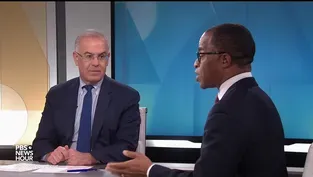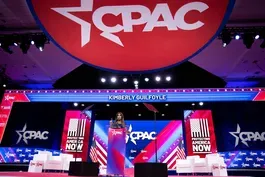
Medal of Honor awarded to Col. Paris Davis
Clip: 3/3/2023 | 10m 10sVideo has Closed Captions
Medal of Honor awarded to one of the first Black U.S. Special Forces officers
One of the first Black military officers to lead an elite unit in combat received the nation's highest award for bravery on the battlefield. The awarding of the Medal of Honor rights what advocates say was a decades-long injustice. Geoff Bennett has the story and a conversation with retired Army Col. Paris Davis.
Problems with Closed Captions? Closed Captioning Feedback
Problems with Closed Captions? Closed Captioning Feedback
Major corporate funding for the PBS News Hour is provided by BDO, BNSF, Consumer Cellular, American Cruise Lines, and Raymond James. Funding for the PBS NewsHour Weekend is provided by...

Medal of Honor awarded to Col. Paris Davis
Clip: 3/3/2023 | 10m 10sVideo has Closed Captions
One of the first Black military officers to lead an elite unit in combat received the nation's highest award for bravery on the battlefield. The awarding of the Medal of Honor rights what advocates say was a decades-long injustice. Geoff Bennett has the story and a conversation with retired Army Col. Paris Davis.
Problems with Closed Captions? Closed Captioning Feedback
How to Watch PBS News Hour
PBS News Hour is available to stream on pbs.org and the free PBS App, available on iPhone, Apple TV, Android TV, Android smartphones, Amazon Fire TV, Amazon Fire Tablet, Roku, Samsung Smart TV, and Vizio.
Providing Support for PBS.org
Learn Moreabout PBS online sponsorshipAMNA NAWAZ: One of the first Black military officers to lead an elite unit in combat today received the nation's highest award for bravery on the battlefield, righting what advocates say was a decades-long injustice.
Geoff Bennett has the story and a conversation with retired Army Colonel Paris Davis.
GEOFF BENNETT: Recognition nearly 60 years overdue.
(APPLAUSE) GEOFF BENNETT: President Biden today awarding retired Army Colonel Paris Davis the Medal of Honor, the U.S. military's most prestigious decoration, for Davis' acts of valor as a commander during the Vietnam War.
JOE BIDEN, President of the United States: Paris, you are everything this medal means, I mean everything this medal means.
And look, you're everything our generation aspired to be.
And you are everything our nation is at our best.
GEOFF BENNETT: Davis, now 83 years old, was one of the first Black officers to lead a U.S. Special Forces team in combat.
On June 18, 1965, Davis, then a captain, led his team, plus 95 South Vietnamese troops, in a predawn raid on a North Vietnamese army camp.
When the raid started, a counterattack forced the group into a rice paddy with no cover.
Every American was wounded, some stranded.
Davis, shot and hit by grenade shrapnel, raced back to rescue his team.
COL. PARIS DAVIS (RET.
), Medal of Honor Recipient: We were sort of submerged in the rice paddy, had been shot twice in the same foot.
GEOFF BENNETT: Davis first spoke of the battle in 1969 on the Phil Donahue show, sharing how he twice refused orders from a commander to withdraw.
COL. PARIS DAVIS: Well, I told him: "Sir, I'm just not going to leave.
I still have an American out there."
GEOFF BENNETT: The combat lasted 19 hours.
His entire team survived.
Immediately after, Davis' commander submitted his name for the Medal of Honor.
But the military lost his paperwork two times, with no record of it ever being submitted.
Davis' team has long argued race played a role.
RON DEIS, Former Special Forces Soldier: It's been emotional, to say the least.
GEOFF BENNETT: Ron Deis, at 79, is the team's youngest survivor.
He's also part of the group of advocates who painstakingly recreated and resubmitted Davis' Medal of Honor paperwork.
What does Colonel Davis mean to you?
RON DEIS: In this past nine years, working with the team to recreate all the documentation it takes for a medal like this, growing very fond of him.
I respected him immensely when I was under his command.
And that's never wavered.
GEOFF BENNETT: We spoke with Colonel Davis the day before the Medal of Honor ceremony.
In June of 1965, Davis was 26 years old, a Black officer leading an all-white unit.
He recalled the day of the attack.
COL. PARIS DAVIS: I remember that the first thing on my mind was to get going.
When you're in a situation that is foreign to you, you take a moment and try to piece it together.
In a war, you don't do that.
GEOFF BENNETT: And you were firing your rifle with your pinkie finger... because your hand was shattered by a grenade.
COL. PARIS DAVIS: That's right.
Not only that.
The grenade knocked out a couple of my teeth and some other things.
And think about fighting, pulling the trigger with your little finger.
It's slippery, blood everywhere, people dying, a volley of the Air Force dropping bombs, the artillery of firing shells.
And all this is happening, and you got a couple of men down.
GEOFF BENNETT: And you twice disobeyed commands to withdraw, to effectively abandon your men.
Well, it was really interesting, because I'm trying to make a decision of what -- how we can really handle the wounded.
I understand he was a general officer and saying: "Don't worry.
Just leave him there.
And we will get him."
And I'd said: "We're not going to -- we're not going to go."
It probably stopped me from being a general officer, because I had disobeyed an order.
GEOFF BENNETT: Immediately after that, your commander submitted your name for the Medal of Honor.
GEOFF BENNETT: But the paperwork inexplicably disappeared twice.
And there was no record of the file.
It strikes me that you didn't have to wonder much about the reason for that.
COL. PARIS DAVIS: The interesting thing there was, the soldiers ere saying: "What's going on here?"
It brought to the fore racism and the different way whites are treated and Blacks are treated.
They had never, to my knowledge, at that time lost a Medal of Honor citation that was lost by a white guy.
But they did with a Black guy.
And the soldiers knew it.
And so it changed the whole complexion of war, especially when you're out there fighting with them, and they know that it's not right.
And the other thing is, more important than that is the fact that I pulled guard duty.
They thought that that was the thing that separated me from other officers, because, when other officers had teams, they never pulled guard duty, that their lives were on the line when they were pulling guard duty.
Why couldn't I?
The other thing that we did was the fact that NCOs all ran patrols.
I was on some of those patrol, not as a leader, but as a machine gunner.
GEOFF BENNETT: President Biden called you to inform you that you would receive the Medal of Honor.
What was that moment like?
COL. PARIS DAVIS: I don't know if a lot of people know the president.
But, in those five or six minutes -- and he wanted to talk longer -- he was so cordial.
Remember the balloons that were up in the sky.
I mean, that's when I got the phone call.
And we started talking.
And he had read a lot of the things that I was doing, good things, the battles and all that, and just a couple of them, not in detail, but it was enough for me to realize that he knew what was going on.
And so, during the conversation, he would ask about the family and about this and that.
There was a time when he said something about lunch, and I said: "Are you going to pay for it?"
(LAUGHTER) COL. PARIS DAVIS: He said: "Why the hell would I have you there if I would have to pay for it myself?"
COL. PARIS DAVIS: And we talked about the - - we were talking about the White House.
And we had a couple of three really nice jokes there that aren't appropriate right now.
But I will tell you, he's got a sense of humor.
GEOFF BENNETT: How do you think you're going to feel when he puts the Medal of Honor around your neck?
COL. PARIS DAVIS: Well, the one thing that I'm really afraid of doing is crying.
The medal means to the Black race than it means to me.
For so long, we have had this reputation of not being part of America.
I think this medal might settle that.
And I think it's really important for something like this to happen.
Luckily, it's happening to me.
This medal means a lot.
It means a lot to America to see that we're all capable of doing -- doing good.
GEOFF BENNETT: What's it like living for 60 years knowing that you deserved recognition for what you were wrongfully denied?
COL. PARIS DAVIS: The thing that bothered me the most is, the military, knowing that, didn't have the gumption to give me a call to say, hey, we lost it, and we can't find it, and then coming back and said: "We understand that someone put the second narrative in, and we can't find it either."
And I'm saying: "You're telling me you lost the citation twice?"
And they said: "No, no, no, we just can't find it twice."
And I said: "Right."
It was something that doesn't happen.
You can name the number of people that have won the Medal of Honor.
And to lose -- just to lose that, that citation, really pissed me off.
But when -- when you find out, the silence is the word.
Nobody calls.
No one says anything for 50 years.
GEOFF BENNETT: Well, it's all being made right now.
So... COL. PARIS DAVIS: That is.
The other thing you is, I'm happy as a pig in you-know-what that it is going to be President Biden.
GEOFF BENNETT: Well, Colonel Davis, congratulations, sir.
It is a real honor to speak with you.
And there are -- there are lots of folks who thank you for your sacrifice, your patience, your diligence, your tenacity, your service.
So, thank you.
COL. PARIS DAVIS: No, thank you.
I really appreciate it.
Brooks and Capehart on CPAC, future of the Republican Party
Video has Closed Captions
Clip: 3/3/2023 | 10m 22s | Brooks and Capehart on CPAC and the future of the Republican Party (10m 22s)
Thousands of Russian convicts sent to fight in Ukraine
Video has Closed Captions
Clip: 3/3/2023 | 8m 12s | From prison to the frontlines: Thousands of Russian convicts sent to fight in Ukraine (8m 12s)
Walgreens ends sale of abortion drug in some states
Video has Closed Captions
Clip: 3/3/2023 | 4m 42s | Walgreens ends sale of abortion drug in some GOP-controlled states where it remains legal (4m 42s)
What this year's CPAC says about Republican priorities
Video has Closed Captions
Clip: 3/3/2023 | 5m 24s | What this year's CPAC says about Republican priorities (5m 24s)
Providing Support for PBS.org
Learn Moreabout PBS online sponsorshipSupport for PBS provided by:
Major corporate funding for the PBS News Hour is provided by BDO, BNSF, Consumer Cellular, American Cruise Lines, and Raymond James. Funding for the PBS NewsHour Weekend is provided by...














